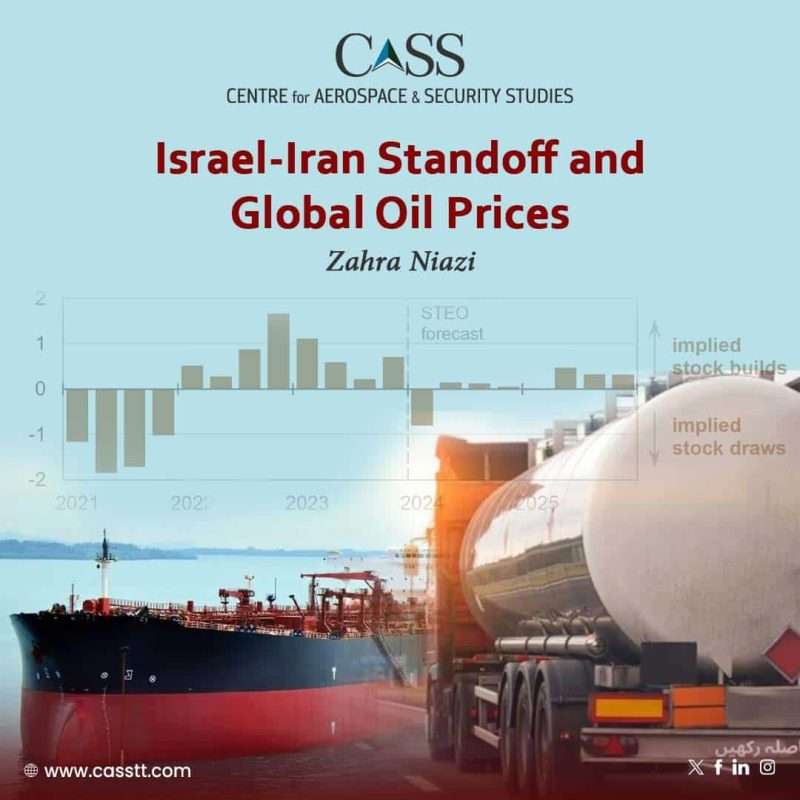The war on Gaza since early October last year has had a limited impact on global oil prices, unlike the spike in oil prices that followed the war in Ukraine, as neither Israel nor the besieged Gaza Strip are significant oil producers.
For context, global Brent crude oil prices increased briefly after the initial violence in early October but began decreasing immediately and did not touch the USD 90 per barrel (/bbl) mark until early April this year. Between December 2023 and January 2024, prices majorly hovered between USD 75/bbl and USD 81/bbl, compared to USD 84.58/bbl on October 6 before the war’s onset.
However, the risk of a global oil price hike has now risen. On April 1, an Israeli airstrike on the Iranian consulate in Damascus killed a senior Quds Force commander and six other officers of the Islamic Revolutionary Guard Corps (IRGC). In response, Iran conducted a retaliatory strike on April 13 and 14, Operation True Promise, which marked Iran’s first direct strike on Israeli territory, with news of Israel hitting Iran’s city of Isfahan on the 19th. According to Bloomberg’s 2023 analysis, a confrontation between these two long-time foes, amid the Israeli war in Gaza can significantly disrupt oil supplies and take global oil prices to USD 150/bbl by pushing them up by as much as USD 64/bbl, similar to what happened after Iraq invaded Kuwait in 1990.
The price of Brent crude oil touched the mark of USD 90/bbl on April 4 and oscillated between USD 89/bbl and USD 91/bbl until mid-April. Additionally, it is important to note that with Russia accounting for 11% of the world’s total oil production, the recent uptick in oil prices was also attributed to the Ukrainian attacks on Russian energy assets that affected several Russian refineries.
Nevertheless, the risk of a much more tangible impact of the Israeli-Iran standoff on the global oil market resulting from material disruptions in oil supplies due to any potential escalation cannot be downplayed.
According to the US Energy Information Administration (EIA), Iran is the ninth-largest oil producer in the world, accounting for 4% or 3.99 million barrels per day (b/d) of oil production. However, one could still argue that certain factors can, to an extent, help offset a supply disruption resulting from Iran’s compromised oil production or export capacity, which, for instance, could occur due to an attack on the Iranian oil facilities or tightened sanctions against Iran. The Organisation of the Petroleum Exporting Countries (OPEC) has a spare production capacity of around 5.1 million bpd, which can be tapped in case of decreased Iranian oil output and exports. Of this 5.1 million b/d, Saudi Arabia and the United Arab Emirates (UAE) have spare production capacities of 3.2 million and one million b/d, respectively, while Iraq and Kuwait hold spare capacities of 400,000 and 300,000 b/d, respectively. In addition, oil production in the US has been on the rise due to improved well efficiencies, and according to the US EIA, the oil output from the top shale-producing regions is expected to rise to the highest level in five months in May. This can also contribute to filling the gap in case of decreased Iranian oil output and exports.
However, any significant disruption in oil flows through the Strait of Hormuz, such as due to attacks on cargo vessels and, in the worst case, a total blockade of the Strait, can have major repercussions for the global oil market. Located between Iran and Oman, this narrow waterway is the world’s most critical oil passageway, responsible for the transit of more than one-quarter, or around 20 million b/d, of total global seaborne traded oil. In such a scenario, the spare production capacity may also not help mitigate the oil crisis as the OPEC nations with spare capacities, including the UAE, Saudi Arabia, Iraq, and Kuwait, export most of their oil via the Strait. Although the UAE, Iraq, and Saudi Arabia have functional pipelines that can provide an alternative route for exports, these pipelines have limited available capacities, equivalent to almost one-quarter of the average daily volume shipped through the Strait of Hormuz in 2023.
The impact of a potential global oil price hike would particularly be felt in the net oil-importing countries, such as Pakistan, which, between July-Feb FY24, imported petroleum group commodities worth USD 9.9 billion, accounting for around 30% of the country’s total import bill. Escalated import costs would adversely affect inflation, exchange rate, and the balance of payment.
The world community, as a moral responsibility, must strongly and vociferously pressurise Israel to desist from its aggressive and offensive actions. A major oil supply disruption due to military escalation/actions between Iran and Israel, would severely undermine efforts to bring global inflation levels down and the world economy back on track.
Zahra Niazi is a Research Assistant at the Centre for Aerospace & Security Studies (CASS), Islamabad, Pakistan. The article was first published in The News International. She can be reached at [email protected].





